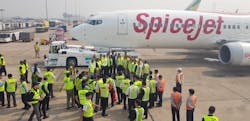KSU Initiates Operations of IAI's TaxiBot Vehicles in Indian Airports
November 1, 2018 - KSU from India has recently initiated TaxiBot operations in Delhi International airport. The first commercial flight that departed from Delhi using the TaxiBot took place on Oct 29, 2018 with a SpiceJet aircraft. The launch of TaxiBot operations followed KSU’s preparations with major stakeholders including DGCA, Delhi International Airport and Delhi Air Traffic Control. Additional Indian airlines including Jet Airways and Indigo Airlines are currently evaluating the TaxiBot for their operations as well. The TaxiBot system offers better efficiency and significant green and economic benefits which will support the rapid growth in India’s aviation market that is expected to become soon the third largest aviation market in the world.
TaxiBot, developed by IAI and TLD, is a semi-robotic vehicle which connects to the aircraft and is controlled by the pilot to taxi the airplane from the airport’s jet bridge (“sleeve”) to the runway with no use of the aircraft main jet engines. The hauling of the aircraft by the TaxiBot saves 85% of the fuel consumed during standard taxi and provides a similar reduction of 85% of the greenhouse gases emitted by the aircraft's main engines. Taxiing with the TaxiBot reduces noise levels by 60% and foreign object damage by 50% as foreign objects can’t be sucked into the aircraft engines if they are not running. An additional benefit is the streamlining and increased throughput of aircraft entering and exiting the terminal area. The Indian government regards the TaxiBot as a significant means for addressing the grave air pollution issues in airports, which are exacerbating due to the continued growth of air transportation.
Benjamin Cohen, IAI VP and General Manager of IAI's Lahav Division, commented, “This is a significant milestone in the development of the TaxiBot program. We are proud to have the opportunity to work together with KSU in order to introduce the TaxiBot into the Indian market. With the ongoing rise in fuel costs, we are confident that the TaxiBot will contribute to the airlines bottom line and will prove itself effective in reducing air pollution, FOD (Foreign Object Damage) and improvement in the gates congestion. The TaxiBot joins many other products that have been introduced by IAI to the Indian market together with many distinguished local partners”.
Ms. Maya Kadosh , charge d'Affairs Embassy of Israel in India said, " This is a huge moment of pride and glory for me, representing the Israeli Government, and witnessing this great initiative by Israel Aerospace Industries (IAI), KSU Aviation Private Limited and TLD, whom are successfully introducing TaxiBots at Indira Gandhi International Airport in Delhi. This is yet another shining example of India-Israel technological partnership. I am proud of the achievement of India and Israel’s strategic partnership as defined by our Prime Ministers during their reciprocal visits. I also proudly represent the Israeli Industries who contribute to implementing this strategy on the ground."
Israel Aerospace Industries:
IAI Ltd. is Israel’s largest aerospace and defense company and a globally recognized technology and innovation leader, specializing in developing and manufacturing advanced, state-of-the-art systems for air, space, sea, land, cyber and homeland security. Since 1953, the company has provided advanced technology solutions to government and commercial customers worldwide including: satellites, missiles, weapon systems and munitions, unmanned and robotic systems, radars, C4ISR and more. IAI also designs and manufactures business jets and aerostructures, performs overhaul and maintenance on commercial aircraft and converts passenger aircraft to refueling and cargo configurations.
